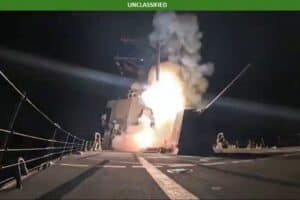The Islamic State group has demolished more treasured monuments.

The Islamic State group has demolished more treasured monuments in Syria’s ancient Palmyra, a month after recapturing it from government forces, the country’s antiquities chief said Friday.
The news is a fresh blow for the UNESCO World Heritage site, which had already been ravaged by the jihadist group during the nine months of control before being expelled in March last year.
“Local sources told us that 10 days ago Daesh destroyed the tetrapylon,” a 16-columned structure that marked one end of the ancient city’s colonnade, Maamoun Abdulkarim told AFP using an Arabic acronym for IS.
Before being forced out of Palmyra in a Russian-backed offensive in March, IS razed world-famous temples and tower tombs at the site.
The UN’s cultural agency reacted with outrage Friday, calling the fresh destruction a “war crime” and “cultural cleansing”.
The tetrapylon, built during the rule of the Roman Emperor Diocletian in the 3rd Century AD, consisted of four sets of four pillars each supporting massive stone cornices.
The monument had suffered considerable damage over the centuries and only one of the 16 pillars was still standing in its original Egyptian pink granite. The rest were cement replicas erected by the antiquities department in 1963.
The Roman amphitheatre dates to the 1st Century AD and was used by IS for public executions during its occupation of the city between May 2015 and March last year.
“From the first day, I was bracing myself for a terrible outcome,” Abdulkarim said.
“We had already witnessed the terror of the first occupation and frankly I had never thought that the city would be occupied for a second time.”
– Strikes kill jihadists –
IS recaptured Palmyra late last year as Syria’s government waged a fierce battle to take back all of the northern city of Aleppo from rebel forces.
The surprise fall of Palmyra, in the central province of Homs, gave IS a propaganda boost as it faced twin assaults on two of its key strongholds — Raqa in Syria and Iraq’s second city Mosul.
Syrian forces have battled to prevent further IS advances around Palmyra, and on Thursday fierce clashes between pro-government fighters and jihadists near a military airport in the region left 30 dead, a monitor said.
The Syrian Observatory for Human Rights said 12 regime forces and 18 IS militants had been killed in the fighting by the Tayfur military airport in Homs province.
Irina Bokova, UNESCO director general, said in a statement that IS’s destruction of Palmyra “shows that cultural cleansing led by violent extremists is seeking to destroy both human lives and historical monuments in order to deprive the Syrian people of its past and its future”.
The jihadist group is just one of the many forces involved in Syria’s complex conflict, which began with anti-government demonstrations in March 2011 and has killed more than 310,000 people since then.
The war has drawn in foreign powers including government ally Russia and a US-led coalition battling IS and other jihadists with links to Al-Qaeda.
A US air strike on Thursday killed more than 100 Al-Qaeda fighters at a training camp in northwestern Idlib province, the Pentagon said.
“The removal of this training camp disrupts training operations and discourages hardline Islamist and Syrian opposition groups from joining or cooperating with Al-Qaeda on the battlefield,” Pentagon spokesman Navy Captain Jeff Davis said.
Late Thursday, a separate round of air strikes killed more than 40 jihadists from the former Al-Qaeda affiliate Fateh al-Sham Front in the west of Aleppo province, the Observatory said.
The monitor could not immediately specify who carried out the strikes against the jihadist group, which is excluded from a fragile nationwide ceasefire in place in Syria since December 30.
– Peace talks Monday –
The truce, brokered by regime ally Russia and rebel backer Turkey, is intended to pave the way for fresh peace talks in the Kazakh capital Astana beginning January 23.
The nature of the talks remains murky following several failed rounds of negotiations.
But in a possible sign of shifting priorities, Turkey — which has long called for Syrian President Bashar al-Assad’s ouster — appeared to row back from its position Friday.
Ankara’s Deputy Prime Minister Mehmet Simsek said at the World Economic Forum in Davos that rebel backers “have to be pragmatic” over Assad’s fate.
“Turkey can no longer insist on a settlement without Assad. It is not realistic,” he said.
Assad himself, in an interview released Friday, appeared to dismiss the possibility of a transitional government or his resignation.
“In our constitution there’s nothing called transitional government,” Assad said. “I’m not the reason of the problem.”






